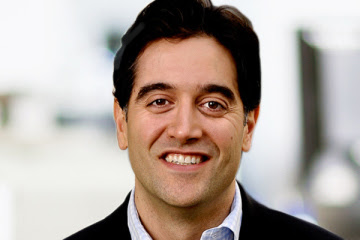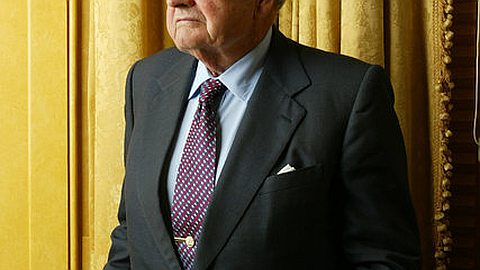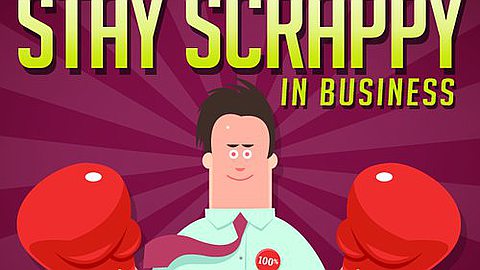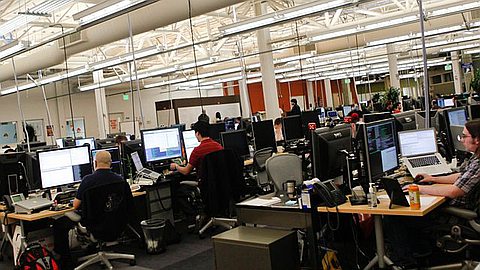The Disrupters

Facebook. Amazon. Apple. Not too long ago, these were the companies upending the status quo — unleashing provocative business models that changed our daily lives even as they transformed entire industries. Now it’s their turn to face the newbies.
The next class of start-ups aims to disrupt the disrupters. This drive to challenge norms is at the core of this year’s Chicago Ideas Week festival — co-hosted by TIME — which kicks off October 8 and features talks with Rahm Emanuel, Michael Bloomberg and many key entrepreneurs. It’s also at the heart of this list.
We examined more than 100 companies across a variety of sectors to highlight eight particularly telling innovations. Some are already reshaping their industries, while others are just getting started. Either way, success is a challenge. “It takes a lot of tweaking,” admits Elaine Chang, CEO of Social Teeth. “But at some point, we’ll get to something really, really good.” Take a look at these eight innovators who are reshaping our world.
Bre Pettis | MakerBot
Manufacturing
 If the rise of 3-D printing is, as some are calling it, the next industrial revolution, the Brooklyn-based startup MakerBot could very well be at the helm of the next age of manufacturing. The firm led by Bre Pettis, 40, produces desktop technology for turning digital designs into physical objects — toys, machine parts, medical equipment, and yes, even less benign creations like gun parts — in a matter of minutes or hours. With its newest model, the Replicator 2 desktop 3-D printer, priced at $2,200, MakerBot is placing itself at the vanguard of a technology once reserved for giant industrial institutions, increasingly within reach of everyone from hobbyists to NASA researchers.
If the rise of 3-D printing is, as some are calling it, the next industrial revolution, the Brooklyn-based startup MakerBot could very well be at the helm of the next age of manufacturing. The firm led by Bre Pettis, 40, produces desktop technology for turning digital designs into physical objects — toys, machine parts, medical equipment, and yes, even less benign creations like gun parts — in a matter of minutes or hours. With its newest model, the Replicator 2 desktop 3-D printer, priced at $2,200, MakerBot is placing itself at the vanguard of a technology once reserved for giant industrial institutions, increasingly within reach of everyone from hobbyists to NASA researchers.
Daniel Ek | Spotify
Music
 Hundreds of thousands of songs at your fingertips for $9.99 a month (or free with ads). That’s the promise of Spotify, a web and smartphone app backed by all four major U.S. record labels that could tempt users to rent their records. “There are millions of people who consume music illegally every month,” says CEO Daniel Ek, 29. “Just getting them into a legal service will make the music industry way bigger than it’s ever been before.”
Hundreds of thousands of songs at your fingertips for $9.99 a month (or free with ads). That’s the promise of Spotify, a web and smartphone app backed by all four major U.S. record labels that could tempt users to rent their records. “There are millions of people who consume music illegally every month,” says CEO Daniel Ek, 29. “Just getting them into a legal service will make the music industry way bigger than it’s ever been before.”
Rob Veres | RedLaser
Commerce
 Bargain hunting has gone mobile. The eBay-owned smartphone app RedLaser, which allows users to scan product barcodes to instantly generate a list of sellers and prices both online and in local stores, is altering the way we shop by (for better or worse) turning bricks-and-mortar stores in showrooms for the vast online commercial universe. Downloaded more than 22 million times, RedLaser, led by its general manager, Rob Veres, 36, sees itself as more than just a pocket-sized price-checker. Partnerships with retailers like Best Buy and Toys”R”Us involving things like location-specific deals, recommendations and in-app payment options make RedLaser an example of the brave new world of commerce that retailers will have to learn to navigate — a tangled hybrid of the physical and mobile realms.
Bargain hunting has gone mobile. The eBay-owned smartphone app RedLaser, which allows users to scan product barcodes to instantly generate a list of sellers and prices both online and in local stores, is altering the way we shop by (for better or worse) turning bricks-and-mortar stores in showrooms for the vast online commercial universe. Downloaded more than 22 million times, RedLaser, led by its general manager, Rob Veres, 36, sees itself as more than just a pocket-sized price-checker. Partnerships with retailers like Best Buy and Toys”R”Us involving things like location-specific deals, recommendations and in-app payment options make RedLaser an example of the brave new world of commerce that retailers will have to learn to navigate — a tangled hybrid of the physical and mobile realms.
Heather Hilleren | Local Dirt
Food
 Food While working at Whole Foods in the early 2000s, Heather Hilleren, 41, noticed a problem. “Buyers played phone tag all day long with farmers on the go,” she says, which made it challenging to include more local growers and maximize produce variety. So Hilleren joined the burgeoning locavore movement with Local Dirt, an online market-place thatconnects thousands of farmers with nearby buyers in every state. Its mission: to cut costs and make it easier for everyone to buy local food.
Food While working at Whole Foods in the early 2000s, Heather Hilleren, 41, noticed a problem. “Buyers played phone tag all day long with farmers on the go,” she says, which made it challenging to include more local growers and maximize produce variety. So Hilleren joined the burgeoning locavore movement with Local Dirt, an online market-place thatconnects thousands of farmers with nearby buyers in every state. Its mission: to cut costs and make it easier for everyone to buy local food.
Cyrus Massoumi | ZocDoc
Healthcare
 Why can’t scheduling a doctor’s appointment be as easy as booking a flight or making a dinner reservation? That’s the question Cyrus Massoumi asked five years ago after he ruptured an eardrum and spent four days searching for a specialist. Nine months later, Massoumi, 36, quit his consulting gig at McKinsey to co-found ZocDoc, a free Web service that helps people book medical appointments online. For patients, the site offers convenience. Searches can target doctors on the basis of specialty, insurance accepted and even available time slots (one reason most ZocDoc appointments are made a day or two in advance, as opposed to the national average of 20 days). For doctors, joining the site — for a monthly fee of $300 — is a relatively low-cost way to bring in new business and fill last-minute vacancies. It’s not necessarily good for customer loyalty: participating doctors agree to let patients rate them on the site, an approach many non-ZocDoc physicians have resisted. Still, the site’s user base is growing rapidly. To maintain momentum, Massoumi plans to introduce new tools, like a check-in feature that stores patients’ routine health data. If that takes off, he says, just “think what it could do if applied to all medical records.”
Why can’t scheduling a doctor’s appointment be as easy as booking a flight or making a dinner reservation? That’s the question Cyrus Massoumi asked five years ago after he ruptured an eardrum and spent four days searching for a specialist. Nine months later, Massoumi, 36, quit his consulting gig at McKinsey to co-found ZocDoc, a free Web service that helps people book medical appointments online. For patients, the site offers convenience. Searches can target doctors on the basis of specialty, insurance accepted and even available time slots (one reason most ZocDoc appointments are made a day or two in advance, as opposed to the national average of 20 days). For doctors, joining the site — for a monthly fee of $300 — is a relatively low-cost way to bring in new business and fill last-minute vacancies. It’s not necessarily good for customer loyalty: participating doctors agree to let patients rate them on the site, an approach many non-ZocDoc physicians have resisted. Still, the site’s user base is growing rapidly. To maintain momentum, Massoumi plans to introduce new tools, like a check-in feature that stores patients’ routine health data. If that takes off, he says, just “think what it could do if applied to all medical records.”
Elaine Chang | Social Teeth
Politics
 Social Teeth, which launched in August, may be a nascent experiment. But its mission — to crowdfund media plans for political ads, à la Kickstarter — is getting lots of election-season buzz. “We give people a chance to support a specific message and a specific plan to help promote that message,” says CEO and founder Elaine Chang, 24. One page, for example, features a video ad for marriage equality as well as a rough outline of how raising $50,000 would help it get airtime on ABC, NBC, Bravo and Hulu and other media. “It’s less about battling it out based on some ballot measure and more about redefining the conversation.”
Social Teeth, which launched in August, may be a nascent experiment. But its mission — to crowdfund media plans for political ads, à la Kickstarter — is getting lots of election-season buzz. “We give people a chance to support a specific message and a specific plan to help promote that message,” says CEO and founder Elaine Chang, 24. One page, for example, features a video ad for marriage equality as well as a rough outline of how raising $50,000 would help it get airtime on ABC, NBC, Bravo and Hulu and other media. “It’s less about battling it out based on some ballot measure and more about redefining the conversation.”
Ben Silbermann | Pinterest
Social Media
 Facebook and Twitter thrive on what users do — where they travel, who they’re hanging out with, which cat videos make them LOL. But Pinterest, that other social-network titan, thrives on what users want: each page on the three-year-old platform is filled with beautiful images of clothing, gadgets and more that have been “pinned” from all over the Internet. As CEO Ben Silbermann puts it, the site is “helping people get inspired and live out those aspirations.” But it’s also, by proxy, reshaping how brands, users and more-established networks define social. Although Pinterest’s early buzz has waned, its emphasis on wanting over liking is still fueling growth — some 20 million people pin every month — and has hooked a user base that buys significantly more than those on Facebook, LinkedIn, Twitter and Tumblr, according to several studies. As a result, big names like Lowe’s and Whole Foods have made the platform an integral part of their branding strategy, and industry analysts speculate that Facebook may soon introduce a Want button.
Facebook and Twitter thrive on what users do — where they travel, who they’re hanging out with, which cat videos make them LOL. But Pinterest, that other social-network titan, thrives on what users want: each page on the three-year-old platform is filled with beautiful images of clothing, gadgets and more that have been “pinned” from all over the Internet. As CEO Ben Silbermann puts it, the site is “helping people get inspired and live out those aspirations.” But it’s also, by proxy, reshaping how brands, users and more-established networks define social. Although Pinterest’s early buzz has waned, its emphasis on wanting over liking is still fueling growth — some 20 million people pin every month — and has hooked a user base that buys significantly more than those on Facebook, LinkedIn, Twitter and Tumblr, according to several studies. As a result, big names like Lowe’s and Whole Foods have made the platform an integral part of their branding strategy, and industry analysts speculate that Facebook may soon introduce a Want button.
Krishna Ramchandran | Ubersense
Sports
 “There are two problems with coaching,” says Krishna Ramchandran. “One, not everyone lives near the coach who can train them best. And two, you can’t take verbal feedback home with you.” So the avid golfer, 34, created Ubersense, a free (for now) mobile app that aims to solve both problems. First, athletes record videos of themselves playing a sport. Then, via Ubersense, they dig deep: pinpointing their errors in slow motion, comparing their form with the pros’ and/or showing it all to their current coach — remotely or in person — for detailed feedback. Since its November 2011 public launch, roughly 800,000 Ubersensers have uploaded 6.3 million videos.
“There are two problems with coaching,” says Krishna Ramchandran. “One, not everyone lives near the coach who can train them best. And two, you can’t take verbal feedback home with you.” So the avid golfer, 34, created Ubersense, a free (for now) mobile app that aims to solve both problems. First, athletes record videos of themselves playing a sport. Then, via Ubersense, they dig deep: pinpointing their errors in slow motion, comparing their form with the pros’ and/or showing it all to their current coach — remotely or in person — for detailed feedback. Since its November 2011 public launch, roughly 800,000 Ubersensers have uploaded 6.3 million videos.





